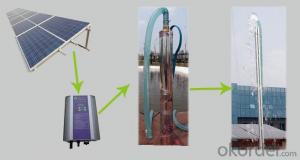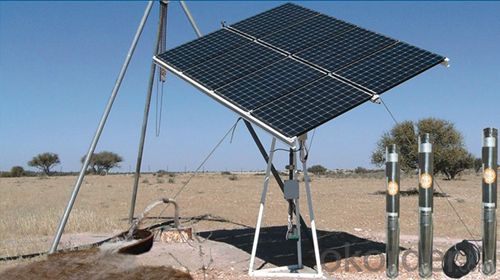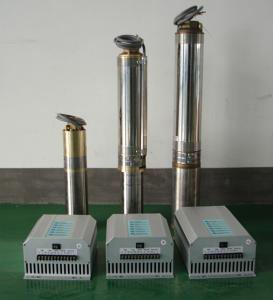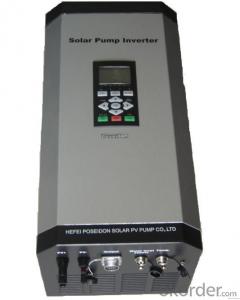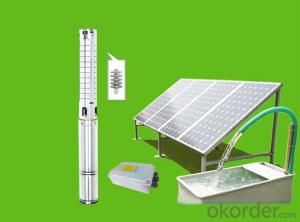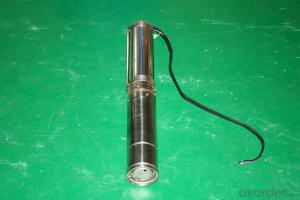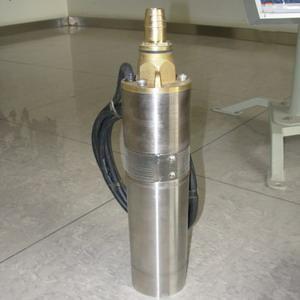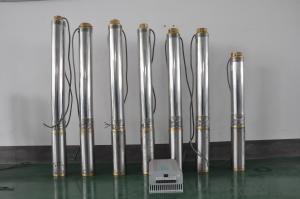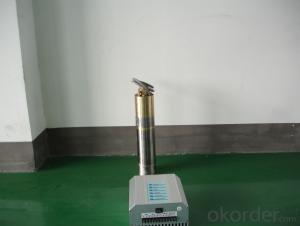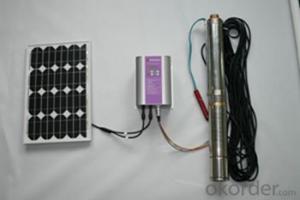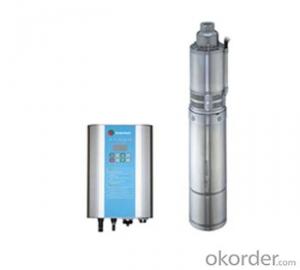Submissive Solar Water Pumping Solar Power Submersible Pump
- Loading Port:
- Shanghai
- Payment Terms:
- TT OR LC
- Min Order Qty:
- 1 set
- Supply Capability:
- 1000 set/month
OKorder Service Pledge
OKorder Financial Service
You Might Also Like
Solar Water Pumping Solar Power Pumps Submersible Pump
DC solar water pumping system consists of the motor, pump, controller, solar array and some other accessories, such as water level sensor, float switch, etc. Considered that storing water is more efficient than storing electricity, the system is designed to directly drive the pump without battery which can reduce the construction and operating cost and routine maintenance effectively.The PV array consists of multiple solar panels connected in series/parallel, which can supply the whole system as power source by converting the absorbed solar radiation energy to the electrical energy. The pump driven by a brushless DC permanent magnet motor draws water from deep-well or river. The pumped water is then fed into reservoir or water tank, or connected to the irrigation system or fountain system directly.
Advanced Technology
Applications Innovation
The efficiency of DC brushless permanent magnet motor has been increased up to 25% in comparison with traditional asynchronous motor.
Technology Innovation
Stator and rotor are sealed by environment friendly casting resin.Motor insulation resistance can be hold higher than 300MΩfor more than 10 years, which consumedly increased the security and reliability of the submersible motor.
Structure Innovation
Casting resign technology processed stator and rotor as well as the water lubricated bearing make the submersible pump environment friendly.
Feature
High Efficiency & High Reliability
DC Brushless Permanent Magnet Motor
Minimum Maintenance, long Service Life
Environment Friendly Materials, Lubricated Without Oil
Application
Village or Family Water Supply
Animal Drinking Water & Livestock Watering
Garden/Courtyard Irrigation
Swimming Pool
Water Supply for Bivouac or Camping Car
Water Supply for Remote Area
Automatic Control
Operate Automatically, No Need Watching
Maximum Power Point Tracking (MPPT)
Dry-run Protection
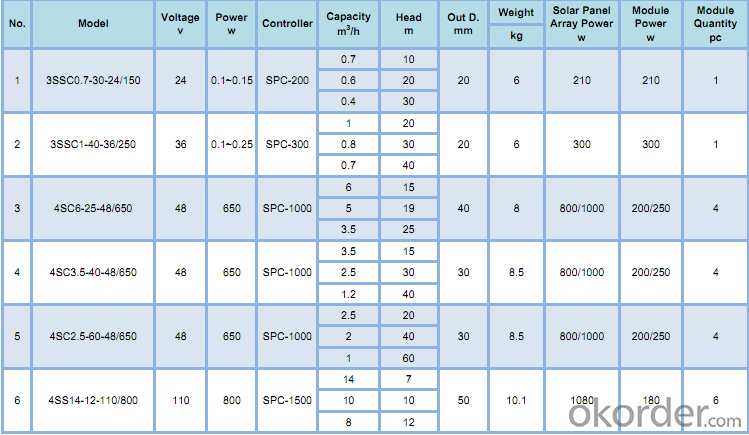
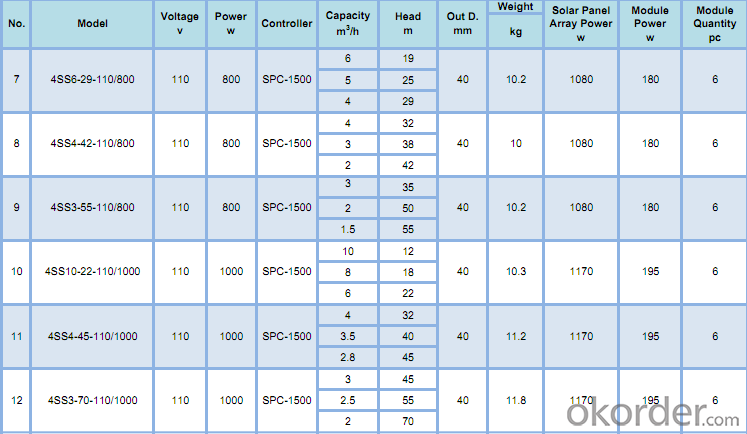
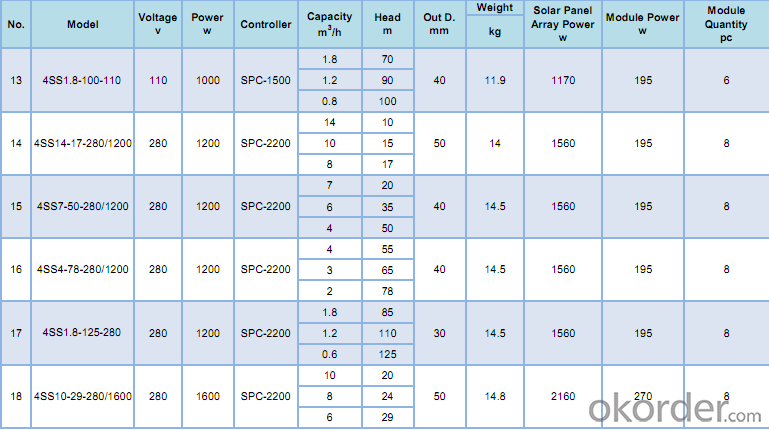
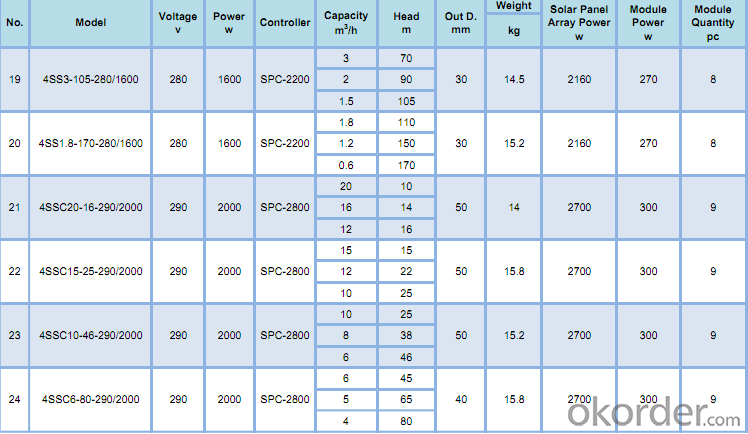
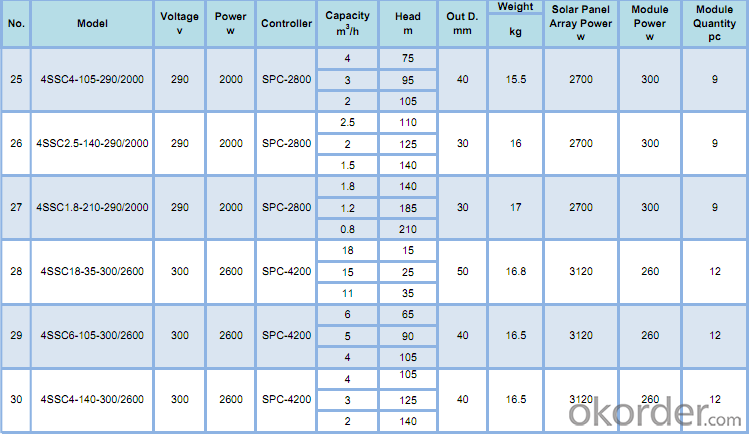
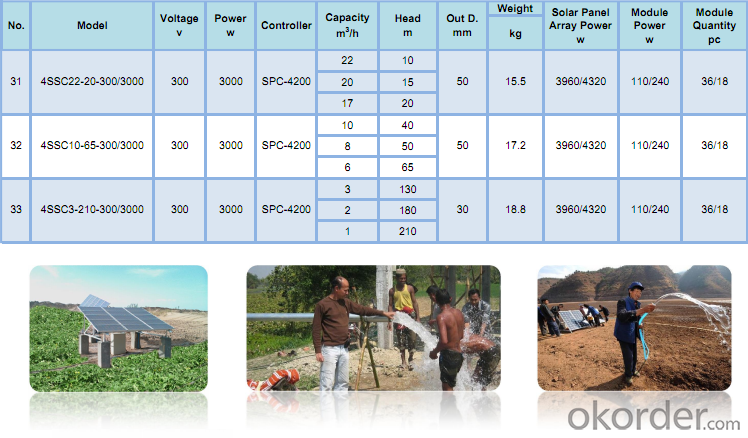
- Q: Can a solar pump be used for fire-fighting purposes?
- Yes, a solar pump can be used for fire-fighting purposes. Solar-powered water pumps are commonly used in areas where there is no access to electricity or during emergencies. These pumps utilize energy from the sun to power the motor, which in turn drives the pump to move water. In fire-fighting scenarios, solar pumps can be used to draw water from a nearby source such as a well, pond, or river and supply it to firefighters for extinguishing fires. They are portable, easy to set up, and can provide a reliable source of water without the need for electricity or fuel. However, it is important to note that the performance of a solar pump may vary depending on factors such as sunlight availability and pump capacity, so it is crucial to ensure that the pump is properly sized and suited for the specific fire-fighting requirements.
- Q: Can solar pumps be used for water supply in remote oil or gas exploration sites?
- Yes, solar pumps can be used for water supply in remote oil or gas exploration sites. Solar pumps offer a reliable and sustainable solution for pumping water in areas where access to electricity is limited or non-existent. They can be powered by solar panels, eliminating the need for fuel or grid connection. Additionally, solar pumps are low-maintenance, cost-effective, and environmentally friendly, making them an ideal choice for remote locations.
- Q: How does the size of the solar pump motor affect its performance?
- The size of the solar pump motor directly affects its performance. A larger motor typically has more power and can generate higher flow rates and water pressures. It also allows for more efficient pumping, as it can handle larger volumes of water. In contrast, a smaller motor may have limited power, resulting in lower flow rates and reduced performance.
- Q: Can a solar pump be used for hydroponic systems?
- Yes, a solar pump can be used for hydroponic systems. Solar pumps are an environmentally friendly and cost-effective option for powering hydroponic systems. They harness energy from the sun to operate, eliminating the need for electricity and reducing operating costs. Additionally, solar pumps are reliable and can provide a consistent flow of water, nutrients, and oxygen to the plants, ensuring healthy growth in hydroponic setups.
- Q: How does a solar pump handle water source contamination from textile manufacturing?
- A solar pump does not specifically handle water source contamination from textile manufacturing. However, it can be used to extract water from contaminated sources and channel it through a filtration system to remove impurities before its usage.
- Q: Are there any government incentives or subsidies for installing solar pumps?
- Yes, there are government incentives and subsidies available for installing solar pumps. Many countries offer various financial incentives, such as tax credits, grants, and subsidies, to encourage the adoption of renewable energy technologies like solar pumps. These incentives aim to make the initial cost of installation more affordable and promote sustainable and clean energy alternatives. It is recommended to research specific government programs and consult local authorities to determine the availability and eligibility criteria for such incentives in a particular region.
- Q: Can a solar pump be used for sewage pumping?
- Yes, a solar pump can be used for sewage pumping. Solar pumps are versatile and can be used for various applications, including sewage pumping. These pumps are powered by solar energy, which makes them environmentally friendly and cost-effective in the long run. Solar pumps for sewage pumping usually have a robust design and can handle the solids and waste found in sewage systems. They are also equipped with features such as self-cleaning mechanisms and high pumping capacities to ensure efficient and reliable operation. By using a solar pump for sewage pumping, not only can you reduce electricity costs and carbon emissions, but you can also have a reliable and sustainable solution for managing sewage in areas without access to grid power.
- Q: Are there any limitations on the temperature range that solar pumps can operate in?
- Yes, there are certain limitations on the temperature range in which solar pumps can operate. Solar pumps are designed to function optimally within a specific temperature range, typically between -40°C to 60°C (-40°F to 140°F). Extreme temperatures beyond this range can affect the performance and efficiency of the solar pump, potentially leading to reduced output or even damage to its components. Therefore, it is essential to consider the temperature range of the location before installing a solar pump to ensure its successful operation.
- Q: Can a solar pump be integrated with other renewable energy sources like wind turbines?
- Yes, a solar pump can indeed be integrated with other renewable energy sources like wind turbines. This integration allows for a more efficient and reliable water pumping system, as it leverages the combined benefits of both solar and wind energy. By combining these two renewable energy sources, the system can operate even when one source is not generating sufficient power. This integration maximizes the overall energy production and enhances the sustainability of the water pumping system.
- Q: Can solar pumps be used for water supply in remote educational institutions or schools?
- Yes, solar pumps can be used for water supply in remote educational institutions or schools. Solar pumps are an efficient and sustainable solution to provide water in areas where electricity is unreliable or unavailable. They harness energy from the sun to power the pump, eliminating the need for grid electricity. This makes them particularly suitable for remote locations, including educational institutions or schools, ensuring a consistent water supply for drinking, sanitation, and other purposes.
Send your message to us
Submissive Solar Water Pumping Solar Power Submersible Pump
- Loading Port:
- Shanghai
- Payment Terms:
- TT OR LC
- Min Order Qty:
- 1 set
- Supply Capability:
- 1000 set/month
OKorder Service Pledge
OKorder Financial Service
Similar products
Hot products
Hot Searches
Related keywords
